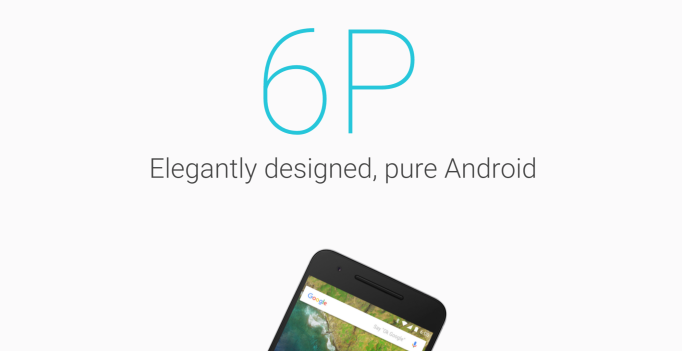At Google’s event on Tuesday, few announcements were more anticipated and expected than the release of a successor to the Nexus 6. Google made good on those expectations with the announcement of the Nexus 6P.
The Nexus 6P arrives on the scene as a flagship phone with premium materials. Designed by Huawei, the world’s third largest smartphone maker according to a report by IDC research, the device has an aluminum body measuring at 7.3mm thin and 6.3oz means. The screen measures 5.7″ and has a resolution of 2560×1440. It uses an AMOLED display with a Corning Gorilla Glass 4 coating for extra protection.
Inside things get even more interesting. The 6P is powered by a Qualcomm Snapdragon 810 and a 64-bit eight-core processor. While we have not had hands on time with the device, initial looks appear solid. Brent Rose with Gizmodo said that it “just screams” and had no noticeable issues with lag during his time with it. The flagship phone also contains a dedicated sensor hub which will help offload data processing from the main processor. This will pair very well with the new deep sleep “Doze” mode and the upgraded 3450 mAh battery. The unit also has two-front facing speakers, an increasingly familiar feature on high end units.
Major changes mostly lay within the software. The Nexus 6P will launch with Android 6.0, also known as Marshmallow and, along with the simultaneously released Nexus 5X, will be the first line of devices built around the new OS. Previous Nexus devices, like the 5 and 6, will receive an update in the next few weeks to upgrade. One of the new features for Marshmallow is fingerprint recognition, called Android Imprint. The 6P and 5X will both contain fingerprint readers on their back sides to take advantage of this new software function. This also means previous attempts at fingerprint reading from manufacturers like Samsung may be rendered unnecessary.
These features come alongside other updates within Marshmallow, including faster voice activated options and the ability to open apps with voice commands, as well as the app having the ability to ask contextual questions to get you to the right place within it. Google demonstrated this on stage with the NPR One app, opening it and replying when it asked whether to resume or start a new session. Visuals within Android 6.0 have also received an update to match the company’s Material Design elements.
As with Apple’s new Macbook and Google’s previous Pixel Chromebook, charging happens through a USB type-c reversible cable. While not as many devices use this standard now, as more devices pick them up they look to become more ubiquitous.
The camera is receiving a major overhaul. The main camera was upraded to 12 megapixels with a Sony made imaging sensor. This camera will be capable of both 4K and slow motion video. The slow motion can handle up to 240 frames per second depending on the resolution. Dave Burke, VP of Engineering at Google described the camera as capable of handing “the toughest of lighting conditions”. The front-facing camera is also getting a boost, to a whopping 8 megapixels. Selfies just got a lot bigger.
The phone will be immediately available through the Google Store in the United States, United Kingdom, Ireland, and Japan. Prices start at $499 for the 32GB model, all the way up to $649 for a massive 128GB. The device will come in “Aluminum”, “Graphite” and “Frost” color options, fancy names for silver, black and white. Those who pre-order the device in the U.S. will recieve $50 in credit on the Google Play store. Those pre-orders will also contain a 90-day subscription to Google Play Music as well.
A new option available at purchase is Nexus Protect, Google’s answer to AppleCare. Doubling the manufacturer’s warranty to two years for $89 on the 6P, the service will also cover accidental damage to the device. Google also stated that turn around time could be as little as next day for replacement.
The phone is compatible with all major carriers in the U.S., including Google’s own Project Fi. A statement from a Google Top Contributor claims the 6P and the 5X will be available with monthly financing options through Project Fi.
